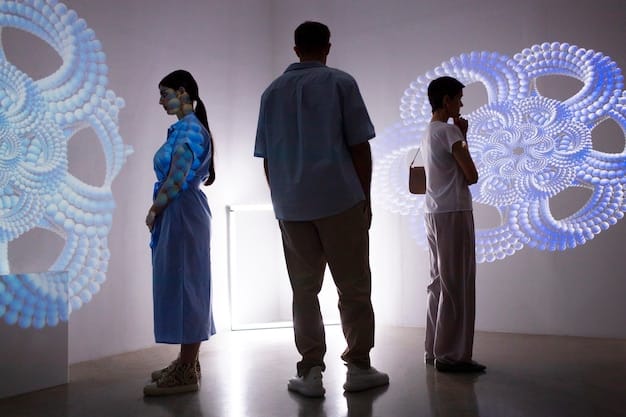AI Ethics: Ethical Concerns of AI’s Impact on US Culture

The ethical considerations of AI’s growing influence on US cultural expression encompass concerns about bias, representation, authenticity, and ownership, raising questions about fairness, cultural preservation, and the potential for homogenization.
The rise of artificial intelligence (AI) is rapidly transforming various aspects of life, and its impact on cultural expression in the United States is particularly noteworthy, and it is crucial to address what are the ethical considerations of AI’s growing influence on US cultural expression?. This influence raises important ethical questions about bias, authenticity, ownership, and representation.
AI and the Blurring Lines of Authenticity
AI’s ability to generate art, music, and literature is testing our understanding of authenticity. When algorithms create content that mimics human expression, it becomes challenging to distinguish genuine creativity from AI-generated imitations. This raises questions about the value we place on human creativity and the potential for AI to devalue it.
The Question of Authorship
Who owns a piece of art created by AI? Is it the developer of the algorithm, the user who provides the prompts, or the AI itself? The lack of clear legal frameworks for AI-generated content creates confusion and potential conflicts over intellectual property rights.
- AI models are trained using vast datasets of existing content, often without the explicit consent of the original creators.
- This raises concerns about copyright infringement and the potential for AI to unfairly profit from the work of others.
- The blurred lines of authorship can also discourage human artists and creators.

The debate also encompasses the idea of how much human intervention is required to consider it human work versus AI work. The ethical implications could be far reaching since people could claim to have created something they did not.
Bias and Representation in AI-Driven Cultural Content
AI systems are trained on vast datasets, which often reflect existing societal biases. When these biases are incorporated into AI algorithms, they can perpetuate and amplify discriminatory stereotypes in the cultural content they generate. This can have a detrimental effect on marginalized communities and reinforce harmful narratives.
Addressing Algorithmic Bias
Algorithmic bias is a critical concern. If the data used to train an AI system is biased, the AI will inevitably produce biased outputs. This can lead to unfair or discriminatory outcomes in various areas, from hiring and loan applications to criminal justice and cultural expression.
There needs to be accountability when it comes to the information the AI is producing, or it can spiral into an uncontrollable monster of misinformation.
Ensuring Diverse Representation
It is essential to ensure that AI-driven cultural content reflects the diversity of the US population. This means actively working to include diverse perspectives and experiences in the datasets used to train AI systems and carefully monitoring AI outputs for bias and misrepresentation.
The AI system must be developed to avoid any type of information that could be misunderstood or construed as offensive.
Data Privacy and the Commodification of Culture
AI systems rely on vast amounts of data, including personal information, to learn and function. The collection, storage, and use of this data raise significant privacy concerns. Moreover, the commodification of culture through AI-driven platforms can lead to the exploitation of cultural heritage and the erosion of traditional values.
- AI-powered platforms often collect and analyze user data to personalize content recommendations and target advertising.
- This data can be used to manipulate users’ preferences and beliefs, potentially undermining their autonomy and freedom of choice.
- The commodification of culture through AI can also lead to the homogenization of cultural expression, as platforms prioritize content that is popular and profitable.
While it may not be something that occurs right away, the possibility is more than realistic, and it is hard to know how it all may play out in the future. A strategy moving forward is to get ahead of the problem.
The Impact on Human Creativity and Employment
The rise of AI-driven cultural content raises concerns about the impact on human creativity and employment. As AI becomes more capable of generating art, music, and literature, human artists and creators may face increased competition and the potential for job displacement.
Supporting Human Artists
It is important to support human artists and creators in the face of AI’s growing influence. This can be achieved through initiatives such as grants, scholarships, and mentorship programs. Additionally, policies that protect the rights of human artists and ensure fair compensation for their work are crucial.
There are many ways to help creators keep their creativity human and not give way to AI, while also recognizing the potential that AI may have.
Education and Skill Development
Workers need to be equipped with the skills and knowledge necessary to navigate the changing job market. This includes training in areas such as AI development, data analysis, and creative problem-solving. Investing in education and skill development is essential for ensuring that workers can thrive in the age of AI.
People can then use the skills to move up in their career or to advance other important avenues toward self improvement. To keep the mind sharp, education is often key to doing so.

Algorithmic Accountability and Transparency
Algorithmic accountability and transparency are essential for ensuring that AI systems are used ethically and responsibly. This means developing mechanisms for auditing AI algorithms, identifying and mitigating biases, and providing clear explanations of how AI systems make decisions. Transparency builds trust and allows for greater public scrutiny of AI technologies.
If there is no transparency, then there is no accountability, and people can be taken advantage of with wrong or harmful information. There need to be people with ethics behind overseeing the accountability of the AI system.
Establishing Ethical Guidelines
Establishing clear ethical guidelines for the development and deployment of AI is crucial. These guidelines should address issues such as bias, privacy, security, and transparency. They should also be regularly updated to reflect the evolving nature of AI technology.
These ethical guidelines can also create a safe space for a better environment overall, in order to ensure that no person is at risk of getting discriminated or harmed.
The Role of Regulation and Policy
Regulation and policy play a critical role in shaping the ethical landscape of AI. Governments and regulatory bodies need to develop policies that promote responsible AI development and deployment, protect individuals’ rights, and ensure that AI systems are used for the benefit of society as a whole.
Without having such practices in place, there can be chaos for the average citizen. People need to have help in such instances and be confident that there is someone on their side, and a regulatory policy can do just that.
- Policies that promote competition and innovation can help prevent the dominance of a few large tech companies and foster a more diverse and equitable AI ecosystem.
- It is important to strike a balance between promoting innovation and protecting individuals’ rights.
- Regulations should be flexible enough to adapt to the rapidly evolving nature of AI technology, while also providing clear guidance and accountability.
Having these plans in place, can also avoid any pitfalls in general, that most people may not see coming.
| Key Point | Brief Description |
|---|---|
| 🎭 Authenticity | AI challenges conventional understandings of authorship and value in cultural creations. |
| 🤖 Algorithmic Bias | Biases in training data can lead to skewed and unfair cultural representations. |
| 🔒 Data Privacy | AI’s reliance on data raises concerns about privacy and the misuse of personal information. |
| ⚖️ Accountability | Establishing accountability and ethical guidelines is crucial for responsible AI use. |
Frequently Asked Questions (FAQ)
▼
Algorithmic bias happens when the data used to train an AI system is skewed, which leads to unfair or discriminatory outcomes. For culture AI, it can lead to certain groups not being represented fairly.
▼
To ensure diverse representation, start including varied perspectives and experiences in training datasets. Also, regularly check AI results for any form of bias.
▼
The ownership of AI-generated content is still being sorted out legally. It could be the developer, the user providing prompts, or the AI itself.
▼
AI systems gather large amounts of personal data, which raises concerns about how this data is collected, stored, and used. This includes worries about user data getting manipulated.
▼
Ethical guidelines can ensure AI is used in responsible and fair ways. These rules should cover bias, privacy, security and always uphold that things are transparent.
Conclusion
The integration of AI into US cultural expression presents both exciting opportunities and significant ethical challenges that need addressing. The United States must foster ethical standards, transparency, and promote diverse perspectives to create AI systems that honor what is good and right. This will balance the benefits of advanced technology while protecting the values and traditions that make up our human existence.





